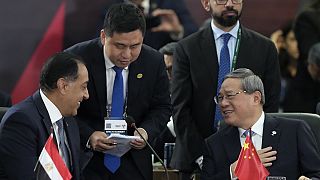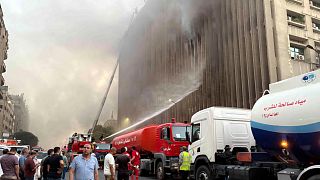Egypt
The European Union’s top diplomat, Federica Mogherini, on Monday said the situation in Libya is improving, citing recent calls for elections and an increase in migrants voluntarily returning to their home countries.
Mogherini, who is attending a quartet meeting in Cairo which includes UN Special Representative for Libya Ghassan Salame, High Representative of the African Union for Mali and the Sahel, Pierre Buyoya and Arab League chief Ahmed Aboul Gheit, said that more than 16,000 migrants have returned voluntarily to their home countries after being held in detention centres in Libya.
“Definitely in the last seven months, we have seen progress on the ground. Still fragile progress, still limited progress, but the trend compared to the past I believe is rather encouraging and needs to be further supported. I believe this is partially due to the fact that we managed to overcome possible divisions of our organisations and we coordinated different strengths of work”, Mogherini said.
Mogherini also said, the EU is committed to addressing the situation of African citizens detained in Libya.
“We committed ourselves to work together, to address the dramatic situation of African citizens detained, in the detention centres in Libya. In only two months we managed to have assisted voluntary returns meaning saving, and having safe returns voluntary, for more than 16,000 people, which is something that is quite remarkable, more than what was done in all previous years”, she added.
During the meeting, the Arab League re-iterated calls for elections to be held before the end of the year in Libya.
The United Nations hopes elections can help stabilise Libya, which was thrown into turmoil after long-time leader Muammar Gaddafi was toppled in a NATO-backed uprising in 2011.
Holding elections remains a major challenge, however, in a country still split among military and political factions, and where rival governments have claimed authority since the result of a disputed 2014 vote.
Security in many parts of Libya is poor, although there is less fighting now between armed groups in Tripoli and other cities, enabling the U.N. and diplomats to spend more time on the ground to help with political transitions.
Reuters













01:13
Voter turnout in Togo's municipal elections overall low
02:11
Witchcraft and politics: Uganda’s election season sparks supernatural surge
01:13
Forty years and counting: CAR once again postpones local elections
Go to video
Greece cracks down on irregular migration, says it’s "not an open corridor to Europe"
02:35
Central African Republic's major rebel groups to disarm, dissolve
01:08
Dancehall superstar Shatta Wale urges young people to back President Mahama